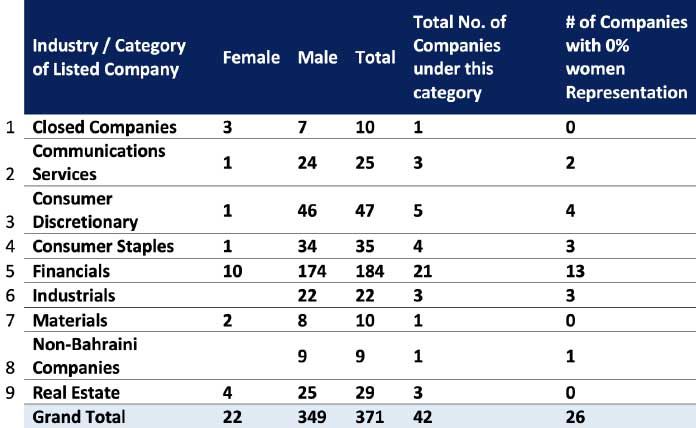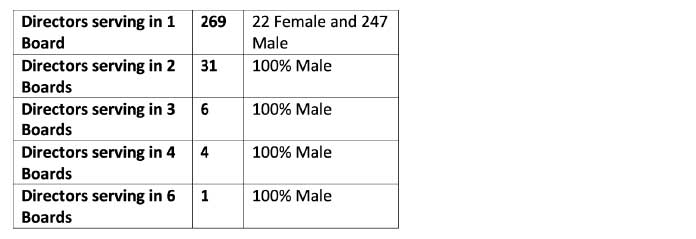Portfolio Management Professional (PfMP) and Accredited Chartered Manager (CMI), Eman Deabil, has written a number of articles for Woman This Month on the topic of ‘Women’s Path to The Boardroom’ and given readers valuable insights into how to climb the corporate ladder and get to the boardroom.
In this article, Eman follows up by looking at the current situation and provides a researched insight into the current situation revealing dramatic statistics of women representation in Bahrain listed companies.
Women in Bahrain, and all around the world, are making waves in the community through their extensive contributions. The role of women in the boardroom in the Kingdom can be strengthened if there is a push for gender equality. Simply put: representation across the board matters.
 5.9 percent – Women Representation in Bahrain Listed Companies
5.9 percent – Women Representation in Bahrain Listed Companies
In 2021 and early 2022, we examined women representation in the boardroom carried out by a sample of 117 organisations based in Bahrain, the percentage was 9.8 percent in 2021, and 11 percent in 2022.
In this article we cover the listed companies in Bahrain. According to the Central Bank of Bahrain (CBB) a “Listed Company means any company whose securities are listed on the Stock Exchange”.
In Bahrain we have 42 publicly listed companies on Bahrain Bourse spanning over nine categories, as seen on the Bahrain Bourse website. An analysis was conducted by looking at the Board of Directors of each company and concluded the following:
 From the above, we can observe that 22 of the total 371 board seats are attributed to women, which represents 5.9 percent. Whereas 349 are attributed to men, which represents 94.1 percent. 26 companies out of 42 (more than the half) have no women representation (0 percent) or in other words, 26 listed companies have all-male boards. Boards’ chairmanship appears limited to males, and no female is chairing any board.
From the above, we can observe that 22 of the total 371 board seats are attributed to women, which represents 5.9 percent. Whereas 349 are attributed to men, which represents 94.1 percent. 26 companies out of 42 (more than the half) have no women representation (0 percent) or in other words, 26 listed companies have all-male boards. Boards’ chairmanship appears limited to males, and no female is chairing any board.
 By analysing the members of the boards, around 60 duplications were observed, and hence we were left with 311 unique directors (actual persons). The total number of male directors were 289, out of which 42 are serving in two to six boards
By analysing the members of the boards, around 60 duplications were observed, and hence we were left with 311 unique directors (actual persons). The total number of male directors were 289, out of which 42 are serving in two to six boards
 From the above analysis, we can conclude that “over-boarding” is limited to male directors in the listed companies, let alone the board directorship roles in other non-listed companies. Some directors are serving in more than 20 – 30 boards inside and outside Bahrain.
From the above analysis, we can conclude that “over-boarding” is limited to male directors in the listed companies, let alone the board directorship roles in other non-listed companies. Some directors are serving in more than 20 – 30 boards inside and outside Bahrain.
According to the ISS Governance (US), “Directors are considered OVER-BOARDED if they sit on a number of boards which could result in excessive time commitments and an inability to fulfill their duties”. The Corporate Governance Code of Bahrain is recommending under principle 1: “One person should not hold more than three directorships in public companies in Bahrain with the provision that no conflict of interest may exist, and the board should not propose the election or re-election of any director who does.”
Over-boarding is not a recommended practice anyway and prevents increasing women representation. The report that was published by Aurora50 in June 2022 ‘Non-executive board careers in the UAE: A path to gender Balance’ stated that: “It is vital for the number of women on boards to increase, but it is equally important that this to be done by increasing the pool of women instead of ‘over-boarding’ existing female directors.”
The same report highlighted the increase of women representation from 3.5 percent in 2020 to 8.9 percent of all UAE listed board positions (i.e. 115 companies). Another report published by Deloitte ‘Women in the boardroom | A global perspective’ highlighted the initiatives that were undertaken to increase women’s representation in boardrooms (e.g. mentoring programmes, director development programmes, quota requirements, UAE Gender Balance Council).
According to the European Institute for Gender Equality (EIGE) France has the strongest representation of women in the boardrooms of the biggest listed companies at 45.3 percent. If Bahrain can score an increase of three percent every year, it will take 13 years to achieve it.
To make this vision possible, we need to have a profound action plan to develop and groom women for directorship positions.
 A leading authority on corporate governance in the Kingdom of Bahrain, Saleh Hussain, shared his views on the subject: “The onboarding of women to various boards of directors in Bahrain needs to receive serious support from not only the government but most importantly from various societal entities such as the Chamber of Commerce and Industry. Continuous lobbying, events and utilisation of various media channels will make a difference.
A leading authority on corporate governance in the Kingdom of Bahrain, Saleh Hussain, shared his views on the subject: “The onboarding of women to various boards of directors in Bahrain needs to receive serious support from not only the government but most importantly from various societal entities such as the Chamber of Commerce and Industry. Continuous lobbying, events and utilisation of various media channels will make a difference.
“In my opinion, the current board membership in Bahrain needs overhauling. Male dominance deprives corporations of diversity of thoughts and discourages application of good governance.”


































